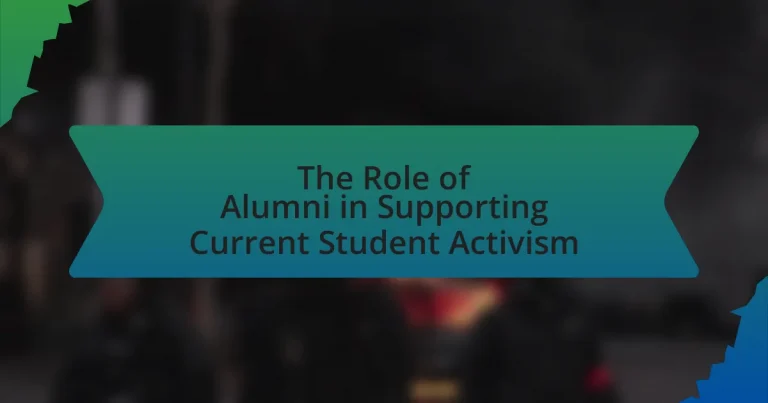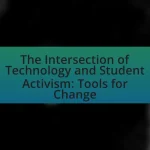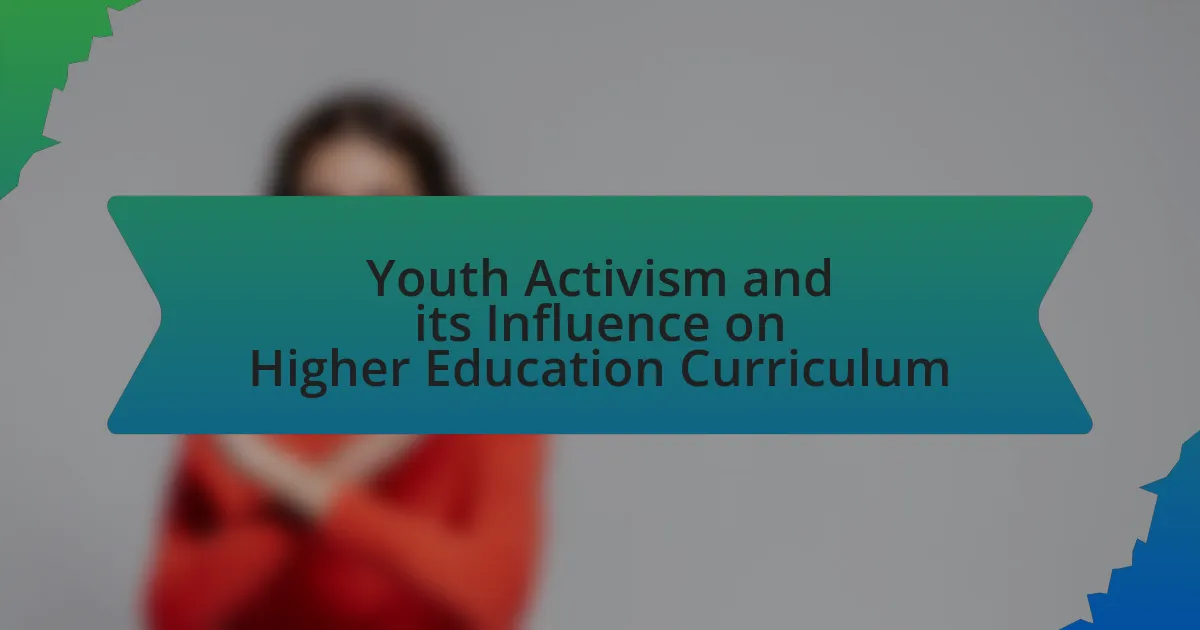The article examines the significant role of alumni in supporting current student activism, highlighting their contributions through mentorship, resources, and networking opportunities. It discusses how alumni influence student activism on campus by providing guidance, funding, and connections that enhance the visibility and effectiveness of student-led initiatives. The article also explores various ways alumni can engage with students, the historical impact of alumni on student movements, and the challenges they face in supporting activism. Additionally, it outlines strategies for fostering collaboration between students and alumni, emphasizing the importance of inclusive events and effective communication to encourage alumni participation in activism.
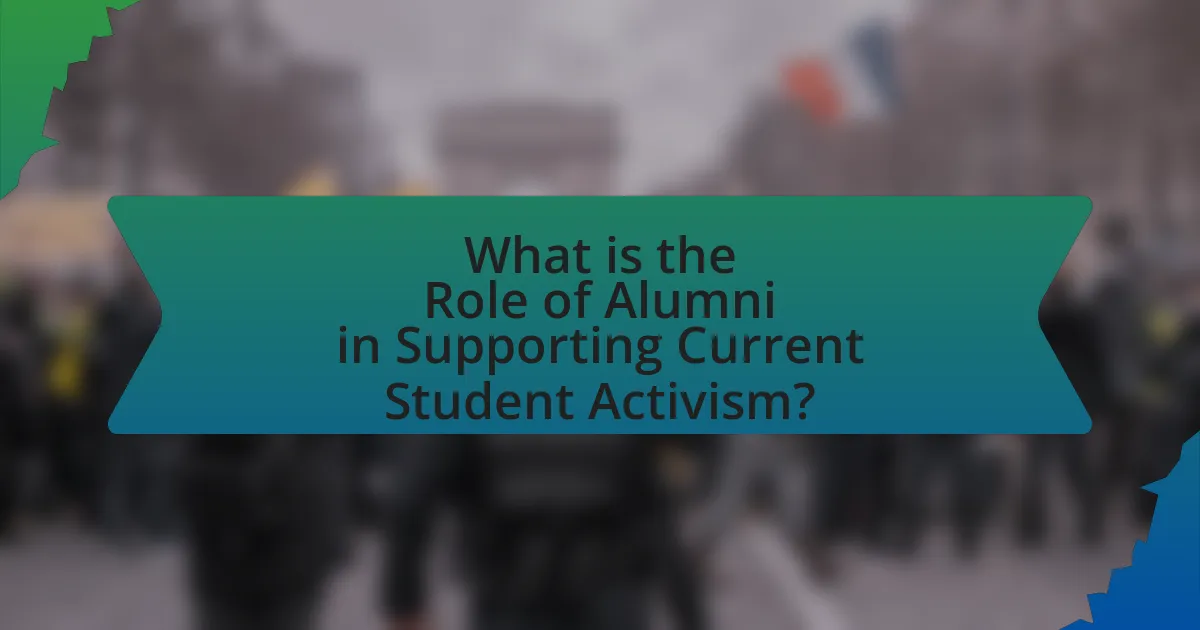
What is the Role of Alumni in Supporting Current Student Activism?
Alumni play a crucial role in supporting current student activism by providing mentorship, resources, and networking opportunities. They often share their experiences and insights, helping students navigate challenges and amplify their voices. For instance, alumni can facilitate connections with influential figures or organizations that align with student causes, enhancing the impact of activism efforts. Additionally, alumni contributions, whether financial or in-kind, can fund initiatives, events, or campaigns that promote social change. Research indicates that alumni engagement significantly boosts student activism outcomes, as seen in various universities where alumni-led initiatives have successfully mobilized support for student-led movements.
How do alumni influence student activism on campus?
Alumni influence student activism on campus by providing mentorship, funding, and networking opportunities. Their experience and connections can empower current students to organize and advocate for social change effectively. For instance, alumni often return to campus to share their insights on activism, which can inspire students and enhance their strategies. Additionally, alumni donations can support student-led initiatives, such as protests or awareness campaigns, thereby amplifying their impact. Research indicates that alumni engagement in activism-related events increases student participation rates, demonstrating a direct correlation between alumni involvement and heightened student activism.
What are the different ways alumni can engage with current students?
Alumni can engage with current students through mentorship programs, networking events, guest lectures, and collaborative projects. Mentorship programs allow alumni to provide guidance and support, helping students navigate their academic and career paths. Networking events facilitate connections between alumni and students, fostering professional relationships that can lead to internships and job opportunities. Guest lectures enable alumni to share their expertise and experiences, enriching the educational environment. Collaborative projects can involve alumni working alongside students on initiatives that promote activism and social change, thereby enhancing students’ practical skills and community involvement.
How does alumni support impact the effectiveness of student activism?
Alumni support significantly enhances the effectiveness of student activism by providing resources, mentorship, and networking opportunities. When alumni engage with current students, they can offer financial contributions that fund initiatives, campaigns, and events, thereby increasing visibility and impact. For instance, a study by the Council for Advancement and Support of Education found that institutions with active alumni networks saw a 30% increase in student-led initiatives compared to those without such support. Additionally, alumni can share their experiences and strategies, guiding students in navigating challenges and amplifying their voices in advocacy efforts. This combination of resources and mentorship creates a more robust platform for student activism, leading to greater success in achieving their goals.
Why is alumni involvement important for student activism?
Alumni involvement is important for student activism because it provides essential resources, mentorship, and a network of support that can amplify student voices. Alumni often have access to funding, connections, and experience that can help current students organize and advocate for their causes effectively. For instance, alumni networks can facilitate introductions to influential figures or organizations, enhancing the visibility and impact of student-led initiatives. Additionally, alumni who have successfully navigated similar challenges can offer guidance and strategies based on their experiences, fostering a sense of continuity and empowerment within the activist community.
What historical examples illustrate the impact of alumni on student movements?
Alumni have significantly influenced student movements throughout history, with notable examples including the involvement of alumni in the Civil Rights Movement and the anti-Vietnam War protests. For instance, alumni from historically Black colleges and universities (HBCUs) played crucial roles in organizing sit-ins and protests during the 1960s, providing both leadership and financial support. Additionally, alumni from universities such as Columbia and Berkeley actively participated in and supported the Free Speech Movement in the 1960s, helping to mobilize resources and amplify student voices. These examples demonstrate that alumni can leverage their networks and resources to enhance the impact of student activism, thereby shaping social and political landscapes.
How does alumni support enhance the visibility of student causes?
Alumni support enhances the visibility of student causes by leveraging their networks and resources to amplify awareness and engagement. When alumni advocate for student initiatives, they often share these causes within their professional and social circles, reaching a broader audience. For instance, alumni can utilize platforms like social media, newsletters, and alumni events to promote student-led campaigns, thereby increasing public interest and participation. Research indicates that alumni networks can significantly influence fundraising efforts, with a study by the Council for Advancement and Support of Education showing that alumni contributions can increase the visibility of student projects by up to 50%. This demonstrates that alumni not only provide financial support but also act as vital connectors, enhancing the overall impact of student activism.

What challenges do alumni face in supporting student activism?
Alumni face several challenges in supporting student activism, primarily including generational differences, institutional barriers, and varying levels of engagement. Generational differences can lead to misunderstandings about the methods and priorities of current student activists, as alumni may not fully grasp the contemporary social and political landscape that shapes student movements. Institutional barriers, such as university policies that restrict alumni involvement or limit funding for activist initiatives, can hinder alumni efforts to provide support. Additionally, varying levels of engagement among alumni can result in inconsistent support, where some alumni are highly active while others remain disconnected from current issues. These challenges can complicate the effectiveness of alumni contributions to student activism.
How can alumni overcome barriers to engagement with current students?
Alumni can overcome barriers to engagement with current students by actively participating in mentorship programs and networking events. These initiatives create structured opportunities for alumni to share their experiences and insights, fostering connections that may not occur organically. Research indicates that mentorship significantly enhances student confidence and career readiness, as evidenced by a study from the National Mentoring Partnership, which found that mentored students are 55% more likely to enroll in college and 78% more likely to hold leadership positions. By leveraging their professional networks and offering guidance, alumni can bridge the gap between their experiences and the current student body, ultimately enriching the educational environment.
What are common misconceptions about alumni involvement in activism?
Common misconceptions about alumni involvement in activism include the belief that alumni are generally uninterested in current social issues and that their contributions are limited to financial support. In reality, many alumni actively engage in advocacy and support for causes relevant to their alma mater and the broader community. For instance, a survey by the Council for Advancement and Support of Education found that 60% of alumni reported participating in activism related to social justice and educational reform. This indicates that alumni are not only willing to support current student activism but often take on leadership roles in these movements.
How do generational differences affect alumni-student relationships?
Generational differences significantly affect alumni-student relationships by influencing communication styles, values, and expectations. For instance, younger alumni, often from the Millennial and Gen Z generations, tend to prefer digital communication and value inclusivity and social justice, which can resonate with current students engaged in activism. In contrast, older alumni may prioritize traditional networking and have different views on activism, potentially leading to misunderstandings or disconnects. Research indicates that these differences can impact alumni engagement levels; a study by the Council for Advancement and Support of Education found that alumni who feel aligned with current student values are more likely to participate in mentorship and support initiatives.
What strategies can alumni use to effectively support student activism?
Alumni can effectively support student activism by leveraging their networks, providing mentorship, and offering financial resources. By utilizing their professional connections, alumni can help students gain access to influential figures and organizations that can amplify their causes. Mentorship from alumni can guide students in developing effective strategies for activism, drawing from their own experiences in advocacy. Additionally, financial support from alumni can fund student-led initiatives, events, and campaigns, which are crucial for sustaining activism efforts. For instance, alumni donations to specific causes have been shown to increase the visibility and impact of student movements, as evidenced by the success of various campaigns funded by alumni contributions in recent years.
How can alumni leverage their networks to benefit student causes?
Alumni can leverage their networks to benefit student causes by connecting current students with industry professionals, providing mentorship, and facilitating fundraising opportunities. By utilizing their established relationships, alumni can introduce students to potential employers, enhancing job prospects and internships. Additionally, alumni can offer guidance and support through mentorship programs, sharing valuable insights and experiences that can help students navigate their academic and career paths. Furthermore, alumni networks can organize fundraising events or campaigns, mobilizing resources to support student initiatives, scholarships, or activism efforts. This collaborative approach not only strengthens the alumni community but also empowers students to achieve their goals.
What role does mentorship play in alumni support for activism?
Mentorship plays a crucial role in alumni support for activism by providing guidance, resources, and networking opportunities to current students. Alumni mentors can share their experiences and strategies for effective activism, helping students navigate challenges and enhance their impact. Research indicates that mentorship fosters a sense of belonging and empowerment among students, which is essential for sustained engagement in activism. For instance, a study by the American Council on Education found that students with mentors are more likely to participate in civic activities and advocacy efforts, demonstrating the positive correlation between mentorship and active involvement in social causes.
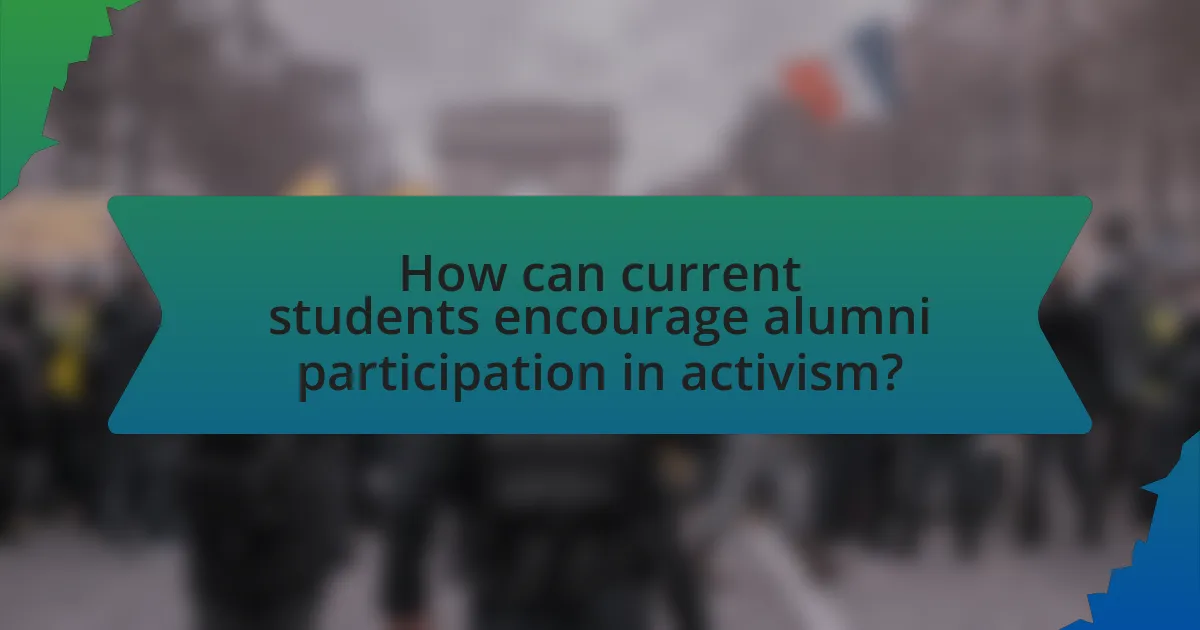
How can current students encourage alumni participation in activism?
Current students can encourage alumni participation in activism by creating inclusive platforms for dialogue and collaboration. By organizing events such as panel discussions, workshops, and networking opportunities that focus on relevant social issues, students can engage alumni who share similar interests. Research indicates that alumni are more likely to participate when they feel a connection to current initiatives; for instance, a study by the Council for Advancement and Support of Education found that 70% of alumni are willing to support causes that resonate with their own experiences during their time at the institution. Additionally, leveraging social media to highlight alumni contributions and successes in activism can foster a sense of community and inspire further involvement.
What communication strategies can students use to reach out to alumni?
Students can use personalized emails, social media outreach, and networking events as effective communication strategies to reach out to alumni. Personalized emails allow students to establish a direct connection by addressing alumni by name and referencing shared experiences or interests, which increases the likelihood of a response. Social media platforms, such as LinkedIn, enable students to connect with alumni in a professional context, facilitating conversations about career advice or mentorship. Networking events, including alumni panels or informal meetups, provide opportunities for face-to-face interactions, fostering relationships that can lead to support for student activism initiatives. These strategies are supported by research indicating that personalized communication significantly enhances engagement rates, as noted in studies on effective networking practices.
How can students create inclusive events that engage alumni?
Students can create inclusive events that engage alumni by actively involving diverse alumni in the planning process and ensuring representation from various backgrounds. This approach fosters a sense of belonging and encourages alumni participation. For instance, conducting surveys or focus groups with alumni can help identify their interests and preferences, leading to tailored events that resonate with a broader audience. Additionally, incorporating themes of social justice and community engagement can attract alumni who are passionate about these issues, thereby enhancing participation. Research indicates that inclusive practices in event planning can increase attendance and satisfaction, as seen in studies conducted by the National Association of Student Personnel Administrators, which highlight the importance of diversity in alumni engagement strategies.
What are best practices for fostering alumni-student collaboration?
Best practices for fostering alumni-student collaboration include creating structured mentorship programs, facilitating networking events, and utilizing digital platforms for communication. Structured mentorship programs allow alumni to share their experiences and insights, which can guide students in their academic and career paths. Networking events, such as workshops and panels, provide opportunities for direct interaction, fostering relationships that can lead to internships and job placements. Digital platforms, like dedicated alumni-student forums or social media groups, enhance ongoing communication and engagement, making it easier for students to seek advice and for alumni to offer support. These practices have been shown to strengthen community ties and enhance student success, as evidenced by studies indicating that mentorship can significantly improve academic performance and career readiness.
How can students and alumni work together to achieve common goals?
Students and alumni can work together to achieve common goals by establishing mentorship programs that facilitate knowledge sharing and networking opportunities. These programs enable alumni to provide guidance based on their experiences, helping students navigate academic and career challenges. For instance, a study by the Council for Advancement and Support of Education found that mentorship significantly enhances student engagement and success rates. Additionally, collaborative projects, such as community service initiatives or fundraising events, allow both groups to unite their efforts towards shared objectives, fostering a sense of community and purpose. This partnership not only strengthens the alumni network but also empowers students to take active roles in their educational and professional journeys.
What tools and platforms can facilitate alumni support for student activism?
Alumni can utilize social media platforms, crowdfunding websites, and dedicated alumni networks to support student activism effectively. Social media platforms like Facebook, Twitter, and Instagram allow alumni to amplify student voices, share events, and mobilize support quickly. Crowdfunding websites such as GoFundMe and Kickstarter enable alumni to financially back student-led initiatives and campaigns. Additionally, dedicated alumni networks and platforms like LinkedIn provide structured environments for alumni to connect with current students, share resources, and offer mentorship, fostering a collaborative atmosphere for activism. These tools enhance communication, resource sharing, and financial support, which are crucial for successful student activism.
What practical steps can alumni take to support current student activism?
Alumni can support current student activism by providing mentorship, financial resources, and networking opportunities. Mentorship involves sharing experiences and guidance to help students navigate their activism effectively. Financial resources can include donations to student organizations or funding for specific initiatives, which can significantly enhance the impact of their efforts. Networking opportunities allow students to connect with influential alumni who can advocate for their causes or provide professional advice. According to a study by the Council for Advancement and Support of Education, alumni engagement can lead to increased funding and support for student-led initiatives, demonstrating the tangible benefits of alumni involvement in activism.
How can alumni contribute time and resources to student-led initiatives?
Alumni can contribute time and resources to student-led initiatives by mentoring students, providing financial support, and facilitating networking opportunities. Mentorship from alumni can guide students in their projects, leveraging their experience to enhance the initiatives’ effectiveness. Financial contributions can help cover costs associated with events, materials, or operational expenses, directly impacting the success of these initiatives. Additionally, alumni can connect students with industry professionals, enhancing their access to resources and expertise, which can lead to more successful outcomes for student-led projects.
What are effective ways for alumni to share their experiences with students?
Alumni can effectively share their experiences with students through mentorship programs, guest lectures, and networking events. Mentorship programs allow alumni to provide personalized guidance, fostering a supportive relationship that enhances students’ academic and career paths. Guest lectures enable alumni to share real-world insights and experiences, enriching the curriculum and inspiring students. Networking events create opportunities for students to connect with alumni, facilitating professional relationships that can lead to internships and job placements. These methods have been shown to increase student engagement and success, as evidenced by studies indicating that mentorship can significantly improve academic performance and career readiness.
